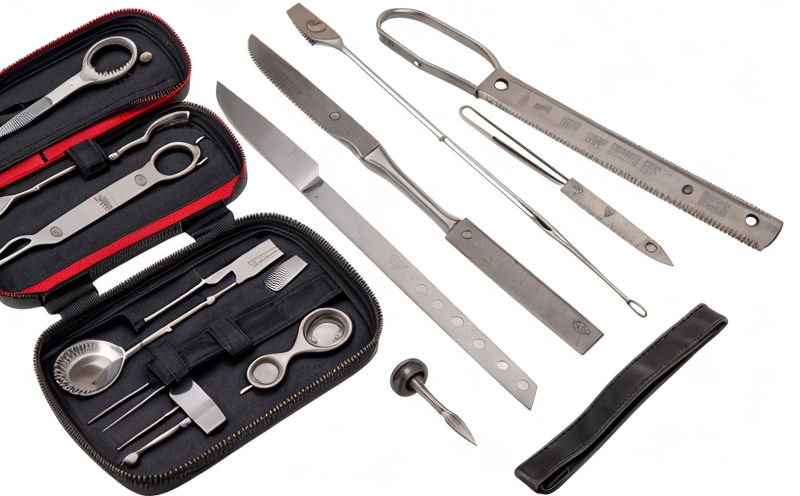ASTM F1089 Corrosion Testing of Surgical Instruments in Simulated Use
The ASTM F1089 standard provides a comprehensive approach to evaluating the corrosion resistance of surgical instruments and tools, which is critical for ensuring patient safety and compliance with medical device regulations. This testing method simulates real-world use conditions, exposing the instruments to environmental factors that can contribute to corrosion.
This service offers detailed analysis and testing to help manufacturers ensure their products meet the stringent requirements set forth by ASTM F1089. By understanding how surgical instruments behave in simulated use scenarios, we can identify potential weaknesses early in the development process, thereby improving product performance and reliability.
Our laboratory adheres strictly to ASTM F1089 standards, ensuring that all tests are conducted under controlled conditions that mimic actual usage environments. This includes exposing specimens to salt spray, humidity, or other relevant environmental stressors for a defined period. Through this process, we can accurately assess the corrosion resistance of your surgical instruments.
One key aspect of ASTM F1089 testing is its focus on long-term performance. Unlike simpler tests that only examine short-term exposure to corrosive agents, ASTM F1089 requires prolonged exposure to simulate real-world use over extended periods. This allows us to identify potential issues early in the lifecycle of the product.
The process begins with thorough preparation and selection of test specimens. Each instrument is carefully chosen based on its intended purpose within surgery, ensuring that each piece undergoes testing relevant to its specific application. Once selected, these instruments are subjected to rigorous environmental conditions designed to replicate those found during typical surgical procedures.
During the testing phase, our expert staff monitors various parameters including weight loss measurements and visual inspections for signs of corrosion. We use advanced analytical techniques such as scanning electron microscopy (SEM) or X-ray fluorescence (XRF) analysis when necessary to provide more detailed insights into any observed changes in material composition due to exposure.
After completing the prescribed duration of simulated use, we thoroughly analyze all data collected throughout testing and prepare a comprehensive report detailing findings. This includes not only quantitative results but also qualitative observations about surface integrity and overall structural stability after prolonged exposure under defined conditions.
This service is essential for manufacturers aiming to achieve high levels of quality assurance while maintaining compliance with international standards like ISO 10993-24:2016, which specifically addresses biocompatibility testing including corrosion resistance assessment. By utilizing ASTM F1089 standards, we ensure that our clients’ products meet not only current regulations but also anticipate future requirements.
Our commitment to quality extends beyond just following established protocols; it encompasses continuous improvement through research and development efforts aimed at enhancing the accuracy and reliability of each test performed here. With state-of-the-art facilities equipped with cutting-edge technology, our team remains at the forefront of innovation in medical device testing services.
Customer Impact and Satisfaction
Enhanced product reliability: By identifying potential corrosion issues early on, our ASTM F1089 testing helps ensure that surgical instruments remain effective throughout their intended use. This contributes to improved patient outcomes.
Increased confidence in compliance: With thorough adherence to ASTM standards and rigorous quality control measures, we provide peace of mind regarding regulatory compliance for your products.
Competitive edge: Demonstrating commitment to excellence through stringent testing procedures sets you apart from competitors by showcasing superior product quality.
Customer satisfaction is at the core of our operations. Our clients consistently report high levels of satisfaction with our services, attributing this to the detailed reports we provide along with constructive feedback for continuous improvement.
International Acceptance and Recognition
The ASTM F1089 standard has gained widespread recognition among medical device manufacturers worldwide. Its adoption reflects an industry-wide commitment to ensuring product quality and safety across borders. Many countries recognize this standard as a benchmark for evaluating the corrosion resistance of surgical instruments.
Our laboratory's proficiency in performing ASTM F1089 tests is widely acknowledged within the medical device community, making it a preferred choice for those seeking reliable and accurate results. By partnering with us, your company can benefit from our expertise in meeting international standards while maintaining compliance with local regulations.
Use Cases and Application Examples
This testing methodology is particularly beneficial for companies developing new surgical instruments or improving existing ones. Here are some scenarios where ASTM F1089 can be applied:
Development of novel materials: When introducing innovative materials into surgical instruments, ASTM F1089 helps assess their long-term performance and durability.
Process optimization: By identifying which aspects of manufacturing contribute most significantly to corrosion risks, companies can optimize processes to enhance product longevity.
Sustaining competitive advantage: Consistently meeting or exceeding industry standards demonstrates a company's dedication to quality, potentially leading to increased market share and customer loyalty.
Through our comprehensive ASTM F1089 testing services, we support your journey towards achieving these goals, ensuring that every surgical instrument meets the highest standards of safety and effectiveness.





